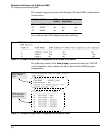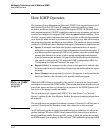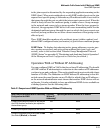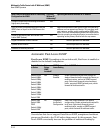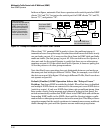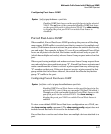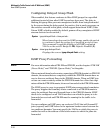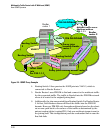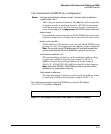
Multimedia Traffic Control with IP Multicast (IGMP)
How IGMP Operates
In the next figure, automatic Fast-Leave operates on the switch ports for IGMP
clients “3A” and “5A”, but not on the switch port for IGMP clients “7A” and 7B,
Server “7C”, and printer “7D”.
Figure 2-3. Example of Automatic Fast-Leave IGMP Criteria
Routing
Switch
Acting as
Querier
Switch
Server
7C
Switch 7X
3A
5A
7A
Fast-Leave IGMP
automatically operates on
the ports connected to
IGMP clients 3A and 5A,
but does not operate on
the port connected to
Switch 7X because the
switch detects multiple
end nodes on that port.
Fast-Leave IGMP does
not activate on this port.
Fast-Leave IGMP
activates on these
two ports.
A1 A3
A4
A6
Printer
7D
7B
When client “3A” running IGMP is ready to leave the multicast group, it
transmits a Leave Group message. Because the switch knows that there is only
one end node on port A3, it removes the client from its IGMP table and halts
multicast traffic (for that group) to port A3. If the switch is not the Querier, it
does not wait for the actual Querier to verify that there are no other group
members on port A3. If the switch itself is the Querier, it does not query port
A3 for the presence of other group members.
Note that Fast-Leave operation does not distinguish between end nodes on
the same port that belong to different VLANs. Thus, for example, even if all of
the devices on port A6 in figure 2-3 belong to different VLANs, Fast-Leave does
not operate on port A6.
Default (Enabled) IGMP Operation Solves the “Delayed Leave”
Problem. Fast-leave IGMP is enabled by default. When Fast-leave is disabled
and multiple IGMP clients are connected to the same port on an IGMP device
(switch or router), if only one IGMP client joins a given multicast group, then
later sends a Leave Group message and ceases to belong to that group, the
switch automatically retains that IGMP client in its IGMP table and continues
forwarding IGMP traffic to the IGMP client until the Querier triggers confir-
mation that no other group members exist on the same port. This delayed leave
operation means that the switch continues to transmit unnecessary multicast
traffic through the port until the Querier renews multicast group status.
2-16



